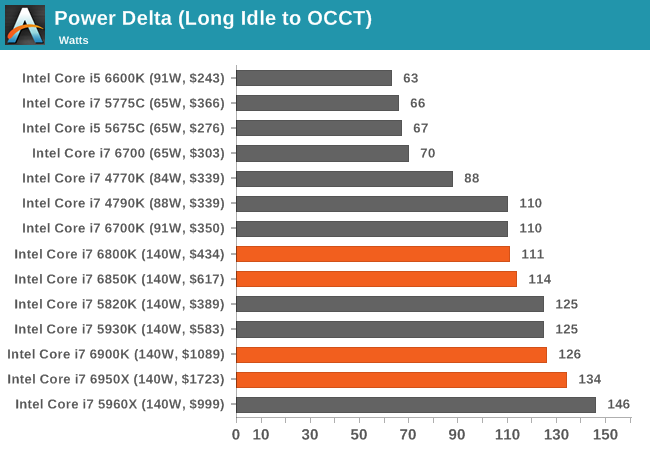The Intel Broadwell-E Review: Core i7-6950X, i7-6900K, i7-6850K and i7-6800K Tested
by Ian Cutress on May 31, 2016 2:01 AM EST- Posted in
- CPUs
- Intel
- Enterprise
- Prosumer
- X99
- 14nm
- Broadwell-E
- HEDT
Load Delta Power Consumption
Power consumption was tested on the system while in a single MSI GTX 770 Lightning configuration with a wall meter connected to the OCZ 1250W power supply. This power supply is Gold rated, and as I am in the UK on a 230-240 V supply, leads to ~75% efficiency > 50W, and 90%+ efficiency at 250W, suitable for both idle and multi-GPU loading. This method of power reading allows us to compare both the power management of the BIOS and the board's ability to supply components with power under load, and includes typical PSU losses due to efficiency.

Each of the Broadwell-E SKUs are rated at 140W, however they vary between 6 cores and 10 cores and with different frequencies. Normally one would assume that the core/frequency ratio would be adjusted to match TDP, but ultimately using more cores can consume more power. We see a distinct increase in power consumption moving up the product stack.
Prime95 Core Loading
For this review, we also looked into peak delta power draw when varying the number of cores using Prime95’s mode for peak power consumption. Prime95 identifies cores with multiple threads and adjusts its loading/pinning accordingly.

Broadwell-E Overclocking
Methodology
Our standard overclocking methodology is as follows. We select the automatic overclock options and test for stability with PovRay and OCCT to simulate high-end workloads. These stability tests aim to catch any immediate issues with memory or CPU errors.
For manual overclocks, based on the information gathered from previous testing, we start off at a nominal voltage and CPU multiplier, and the multiplier is increased until the stability tests are failed. The CPU voltage is increased gradually until the stability tests are passed, and the process repeated until the motherboard reduces the multiplier automatically (due to safety protocols) or the CPU temperature reaches a stupidly high level (100ºC+). Our test bed is not in a case, which should push overclocks higher with fresher (cooler) air.
Overclock Results
Due to time constraints we were only able to overclock the i7-6950X using the MSI X99A Gaming Carbon motherboard. MSI has improved its overclocking options as of late on the Z170 platform to make it easier to use, but our BIOS did not have those most recent updates, particularly for load line calibration. However, our sample hit 4.1 GHz at 1.30 volts before the OCCT load temperatures were prohibitive to move up any further. We saw similar things when testing the mainstream Broadwell parts with Iris Pro, which shows that this sort of overclocking performance might be indicative of the silicon itself.
That being said, speaking with our contacts at various motherboard manufacturers, we're told that 4.1 GHz is a reasonably average processor result for Broadwell-E. Some processors will hit 4.3 GHz on air at around the same voltage, whereas others need up to 1.4 volts, and thus results will depend on the cooling setup used or the thermal characteristics of the silicon. I have also been told that AVX is a different story: for any peak frequency attained normally, AVX overclock stable frequencies will be around 200-300 MHz lower.











205 Comments
View All Comments
ShieTar - Tuesday, May 31, 2016 - link
You could have saved some money by not ordering a CPU on the very first day of availability. Other than that, there is no downside to having a 6800K instead of a 5820K, its just not vastly faster.ezcameron76 - Tuesday, May 31, 2016 - link
What would have been the difference in getting it say next week or at what time would you say would be better. I have to have the PC build by this Thursday so didn't have the time but I wouldn't think the price would change in a short amount of time.ShieTar - Tuesday, May 31, 2016 - link
About 50$ I assume. Don't know how to find this info for the US, but in Germany prices have dropped by 30€ from yesterday to today:http://geizhals.eu/?phist=1394467
ezcameron76 - Tuesday, May 31, 2016 - link
I paid $450 on neweggezcameron76 - Tuesday, May 31, 2016 - link
My question is should I return the 6800k for the 5820k as it will overclock better or no?ShieTar - Wednesday, June 1, 2016 - link
Not really, the first 10% of better OC will be wasted on compensation of the IPC improvement anyways. And with virtually no CPU-limited games out there, you don't really need to OC anyways.TEAMSWITCHER - Tuesday, May 31, 2016 - link
I'm not sure. Most of the reviews are overclocking the 10-core 6950X. I'm wondering if there will be some sweet 6-core parts (6800K and 6950K) that overclock great because the four disabled cores are used separate the six functional cores. I'm speculating that having active cores separated by inactive cores might help to impede thermal accumulation.It's a funny thought I had today, but I don't know of any way to find out which cores are disabled.
HighTech4US - Tuesday, May 31, 2016 - link
Where the heck is the GTX 1080 review?It's been weeks since the NDA was lifted on it and now with the NDA lifted on the GTX 1070 nothing again.
Since there was time to do this review excuses about not enough time to do a proper review won't hold water.
fanofanand - Tuesday, May 31, 2016 - link
960 *cough*JanSolo242 - Tuesday, May 31, 2016 - link
For a mere $4,115, why not order a 22 core Xeon? :-Dhttp://ark.intel.com/products/91317/Intel-Xeon-Pro...